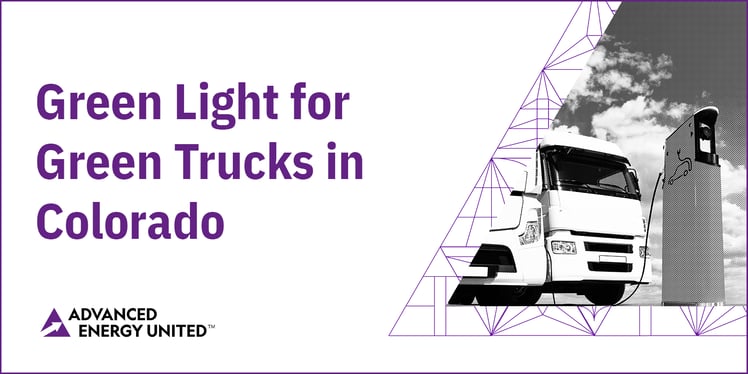
To achieve a fully electrified transportation system in America, we need individual states to take both legislative and regulatory action to encourage mass market adoption of electric vehicles across all vehicle types. Colorado continues to be a leader in this effort, and in April, the state adopted the Advanced Clean Trucks rule, becoming the first state in the Rocky Mountain Range and the eighth state in the nation to do so. This will impact Coloradans in three big ways: healthier air, lower emissions, and a stronger economy.
The Advanced Clean Trucks (ACT) rule will take effect in Colorado in 2027 and will require auto manufacturers to deliver a gradually increasing percentage of electric medium- and heavy-duty vehicles to Coloradans. By starting the rule to begin in 2027, it gives auto manufacturers time to increase production and investment so they can make sure to give Coloradans increased choice and flexibility to integrate zero-emission technologies into their fleets. The automotive industry is already pivoting away from traditional gas engines as demand for electric vehicles heats up. New incentives in the Inflation Reduction Act, passed by Congress last year, will increase the demand for clean commercial vehicles higher, while the ACT rule will help ensure a wider choice of zero-emission vehicle models are available to consumers.
Making more clean trucks available will drive big economic benefits to Colorado businesses. Many of the people who operate trucks and vans are small business owners who are particularly sensitive to the volatile fuel prices and high lifetime maintenance costs that come with internal combustion engines. Fortunately, the operating costs of electric trucks are significantly lower than their diesel counterparts. By switching their fleets to zero-emissions, small businesses all over the state can net an estimated $5.8 billion in cumulative savings by 2050. These trucks also have a 13% lower total cost of ownership compared to a diesel equivalent, equaling a net savings of $200,000 over a truck’s life.
Because of how the ACT rule’s scaling requirements work in tandem with federal and state incentives for electric vehicles, the customers for clean trucks and electric vans will see their money go even further by buying new and retrofitted vehicles from U.S companies. One such Colorado company, Lightning eMotors, is providing new jobs for highly skilled technicians as production ramps up at their newly expanded Loveland facility. But that’s just scratching the surface of potential clean transportation careers. Colorado’s electric transportation workforce is already one of its fastest growing, with jobs increasing by 32 percent in 2021 alone.
There were also considerable health and environmental benefits that Colorado’s Air Quality Control Commission rightly examined before adopting the measure. Air pollution is a particularly significant public health issue in Colorado, with the state receiving an “F” grade for its ozone pollution levels in the American Lung Association’s 2023 State of the Air report. Requiring truck, van, and bus manufacturers to sell more zero-emission vehicles has the potential to significantly improve air quality and protect public health. It means that more of the delivery trucks that drive through our communities, and school buses that idle in neighborhoods to pick up our kids, won’t be releasing toxic fumes into the air. Currently, medium- and heavy-duty vehicles account for less than 2% of all vehicle miles traveled in the Denver Metro area but contribute 24% of on-road NOx emissions. This is primarily due to their reliance on diesel fuels, according to the Regional Air Quality Council.
The Colorado Energy Office estimates that the ACT regulation has the potential to reduce greenhouse gas emissions by up to 2.1 million tons in 2050. This is equivalent to taking approximately 456,000 cars off the road for a year. According to data from the American Lung Association, by adopting the ACT rule, the communities of Denver and Aurora may:
- save $5.4 billion in health-related costs
- avoid 485 premature deaths
- avoid 18,500 asthma attacks
- avoid 89,000 lost workdays by 2050.
As we look to a zero-emission future, market-driven policies like the ACT rule will play a critical role in accelerating the transition to a sustainable and equitable economy. By adopting the ACT rule, Colorado has taken meaningful action to protect public health, reduce greenhouse gas emissions, and bolster the state’s economy. Now that the state has given manufacturers and fleet owners the green light to go electric, let’s get moving!